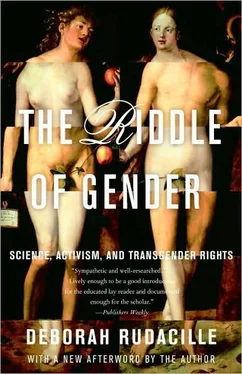So, I just thought, “Well, there hasn’t been a lot of research, and what do they know anyway?” It was really only after I moved to the Bay Area and read a newspaper article about James Green [a well-known Bay Area transman and activist] that I realized that there was anyone else out there like me. I had never really talked to anybody. I just felt kind of ashamed of it.
Q: Yet you grew up in a time when there was extensive media coverage of celebrity transsexuals like Chris Jorgensen and Rene e Richards. You didn’t make the connection?
No, I never did. Partly because while I was in high school, college, and medical school, I never read the newspaper. I never watched TV. I was very intense about my studies. I knew a lot about science, but I didn’t know a lot about other stuff. I was a typical science geek, and I really had no other interests. It wasn’t until I came here [to Stanford] that I started reading the newspaper. I was just very driven. I worked seven days a week, fifteen-hour days, right through training. So I didn’t hear a lot about those people.
Then after two years of being here, I got breast cancer, which runs in my family. My mother died of it when she was my age. So when I had breast cancer I remember going to have the surgery, and even though they had picked it up early and it hadn’t spread, I begged my doctor to do a bilateral mastectomy, even though only one breast needed to come off. I said to him, “You know my mother died of this. I think it’s genetic and I think it would be best to do it [the double mastectomy] as prophylaxis.” This was before the [BRCA] gene test was available. It turns out that a couple of years afterward, I did have the gene test and I did test positive. Anyway, I finally did manage to convince him to cut it off, over a lot of objections. This was one of the things that made me feel very comfortable about the gender change later because I remember leaving that doctor’s office feeling like this was the best thing that had ever happened to me. And I remembered that when my mother went through it, she just had one breast cut off, and it was so traumatic for her. So incredibly traumatic. And I experienced nothing like that. I was happy to have them cut off. I was relieved. “Relief” is a really good word to describe it.
But at this hospital where I had my surgery, they also did sex changes, and I remember one of the nurses talking about this person who’d changed from male to female, and I remember thinking, “Man, what a pervert. How weird.” I think I had the same reaction that everybody else had: “What a bunch of weirdos.” And I never related that to me. I don’t know what that’s about. Here I am, a doctor. I’ve been confused about my gender my whole life, but I didn’t—maybe it’s some form of denial—but I still find it fantastic that I didn’t make the connection. And then you read this article, and it’s like in your face. It was so moving. It was like everything he said was the story of my life. And in the article it mentioned this clinic right down the street and how you need to get this evaluation. So I just contacted them, filled it out, and the next thing you know they were seeing me and saying, “You are a classic case. Would you like to change your sex?”
It was all done very quickly. There was a period of a few weeks where I was pretty stressed because I was thinking, “Do I really want to do this?” And you know, a lot of transsexuals, when they change their sex, they move somewhere and change their entire identity. But I am internationally known, and my whole career rests on my not changing my last name at least. So that was rough, wondering if I would lose my career, lose my job, wondering whether students would still come to my lab. So I thought about it a lot. And I actually talked to some senior people here about what I was thinking about doing, and when they said that they didn’t think that it would hurt my career, that made me feel good.
I really felt by that point that life had been so hard on me—I never feel like I really do a good job of explaining what it was like, but I didn’t sleep a lot of nights, I was suicidal, life was so uncomfortable. Don’t get me wrong, I’ve really enjoyed my life, but somehow it’s like it was split into two parts. The personal part, which has been very uncomfortable, and the professional part that’s been a pleasure, that I’ve really enjoyed. But the personal part was just so uncomfortable that sometimes you think, “I’ve had enough.” It’s that distressing.
So, at the time I went to the clinic, I just felt like it was either this or suicide. I didn’t see any other alternatives. And it all happened very quickly. Within a few months of being seen, I was on hormones and then within a few months after that, I had my ovaries taken out—which was actually prophylactic surgery for the genetic mutation that I had, although female-to-male transsexuals really should have their ovaries taken out anyway. Then when I came back to work after the oophorec-tomy, I had begun shaving, and I sent a letter out to a few people in the department letting them know that I was changing my sex. It’s amazing how when you are well known, how quickly rumors get around. Really, within a day or two after sending out that letter, everybody around the world knew. Especially with e-mail, you can imagine how quickly the news spread, and of course there was a lot of talk, but after a couple of months it died down. Everyone here at Stanford has been fantastically supportive, from students, my faculty here, the deans.
Q: Your first scientific meeting after transition must’ve been interesting.
Some people made funny comments about it, but most people just didn’t say anything. I’m sure they were shocked. The hardest thing is pronouns. It’s very hard for people to switch. Most of them are very good about that, but every once in a while they’ll slip, particularly if they’ve had any alcohol. I have trouble with it myself sometimes. I was just interviewing a young female-to-male transsexual who lost her job when she … he announced that he was changing sex and came to talk to me about the possibility of a job here, and throughout the whole interview I kept calling him “her.” Once I know, even I do it. And I had to keep checking myself. I don’t care if someone accidentally calls me “she.” I care if they do it systematically and as a form of harassment. Fortunately, that hasn’t happened to me.
I feel like I had this gender issue, I dealt with it, and it’s resolved. The most important thing is that I’ve been happy. I’ve been so much happier. I enjoy life now.
Q: It seems like FTMs in general choose to transition and then get on with their lives. They don’t seem so interested in activism, in being out and politically active as MTFs.
Well, I’m out. I don’t hide it. Hiding is why people are so ignorant about transsexuality. That’s why it took me so long to figure it out. But I think that males to females are so much more defensive in how they deal with it afterward. It seems to me that not that many males to females remain in the same job that they were in before they changed. For example, a geology professor here at Stanford changed male to female, and she totally changed her research. She does gender studies now. She had a much rougher time [than I]. She had a very difficult time. I think that the medical school is a more accepting environment because we are biologists, familiar with biological variation. Geology is much more of a macho, male-dominated field.
Q: What do you think about gender? Is it in the body or the mind? Is it biological or is it social?
I think that there is something bimodal about gender. Biologically bimodal because it’s important for evolution and all species have it. Males and females are designed differently, and it’s all under the influence of hormone-driven programs, and if you look at behavior, male and female behavior is different, and I don’t think that’s all social. In fact, some of the best evidence for that comes from transsexuals. If you look at female-to-male transsexuals and results of their spatial tests before and after testosterone—and hundreds of studies have shown, and everyone agrees, that males and females differ in certain verbal and spatial tests—what’s cool about transsexuals is that they are their own control; you can do before-and-after tests. They have the same genes; the only thing that’s different is the hormones—and you find that female-to-male transsexuals become more malelike in their spatial abilities after testosterone. So there clearly are some gender-specific things that are controlled by hormones.
Читать дальше












